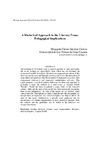Identificador persistente para citar o vincular este elemento:
https://accedacris.ulpgc.es/jspui/handle/10553/57943
| Campo DC | Valor | idioma |
|---|---|---|
| dc.contributor.author | Sánchez Cuervo, Margarita Esther | en_US |
| dc.date.accessioned | 2019-11-18T18:42:40Z | - |
| dc.date.available | 2019-11-18T18:42:40Z | - |
| dc.date.issued | 2016 | en_US |
| dc.identifier.issn | 0214-4808 | en_US |
| dc.identifier.other | Dialnet | |
| dc.identifier.uri | https://accedacris.ulpgc.es/handle/10553/57943 | - |
| dc.description.abstract | The teaching of the literary essay is usually ignored in many universities due to its probing and inconclusive form which has not favoured the existence of models of analysis. However, the argumentative nature of this discourse can be examined through a reading that allows the recognition of some rhetorical operations like the invention of arguments (inuentio), their arrangement (dispositio) and expressive manifestation (elocutio). This article proposes a model of analysis following this rhetorical approach. In particular, I apply this analysis to a short essay by Virginia Woolf, ‘Royalty’. Woolf has been considered a major writer of the twentieth century. Although the style of her novels has been extensively researched from diverse perspectives, the style of her essays has not received much critical attention. Throughout my study, I indicate how the recognition and interpretation of arguments and rhetorical figures can help to define the style of this essay. Furthermore, I provide some guidelines for the identification and further interpretation of these rhetorical elements. Both the analysis and the guidelines can be useful in the literature and composition classes. | en_US |
| dc.language | eng | en_US |
| dc.relation.ispartof | Revista alicantina de estudios ingleses | en_US |
| dc.source | Revista alicantina de estudios ingleses [ISSN 0214-4808], n. 29, p. 199-212 | en_US |
| dc.subject | 5801 Teoría y métodos educativos | en_US |
| dc.subject | 620205 Retórica | en_US |
| dc.subject.other | Teaching literature | en_US |
| dc.subject.other | Literary essay | en_US |
| dc.subject.other | Argumentative discourse | en_US |
| dc.subject.other | Rhetorical figures | en_US |
| dc.subject.other | Virginia Woolf (1882-1941) | en_US |
| dc.title | A Rhetorical Approach to the Literary Essay: Pedagogical Implications | en_US |
| dc.type | info:eu-repo/semantics/article | en_US |
| dc.type | Article | en_US |
| dc.identifier.doi | 10.14198/raei.2016.29.11 | en_US |
| dc.identifier.url | http://dialnet.unirioja.es/servlet/articulo?codigo=6051928 | - |
| dc.description.lastpage | 212 | - |
| dc.identifier.issue | 29 | - |
| dc.description.firstpage | 199 | - |
| dc.investigacion | Artes y Humanidades | en_US |
| dc.type2 | Artículo | en_US |
| dc.contributor.authordialnetid | 1000472 | - |
| dc.identifier.dialnet | 6051928ARTREV | - |
| dc.identifier.ulpgc | Sí | es |
| dc.description.sellofecyt | Sello FECYT | |
| dc.description.dialnetimpact | 0,0 | |
| dc.description.dialnetq | Q1 | |
| dc.description.dialnetd | D3 | |
| dc.description.erihplus | ERIH PLUS | |
| item.grantfulltext | open | - |
| item.fulltext | Con texto completo | - |
| crisitem.author.dept | GIR Discourse, Communication and Society | - |
| crisitem.author.dept | Departamento de Filología Moderna, Traducción e Interpretación | - |
| crisitem.author.orcid | 0000-0002-5562-8837 | - |
| crisitem.author.parentorg | Departamento de Filología Moderna, Traducción e Interpretación | - |
| crisitem.author.fullName | Sánchez Cuervo, Margarita Esther | - |
| Colección: | Artículos | |
Visitas
241
actualizado el 15-ene-2026
Descargas
199
actualizado el 15-ene-2026
Google ScholarTM
Verifica
Altmetric
Comparte
Exporta metadatos
Los elementos en ULPGC accedaCRIS están protegidos por derechos de autor con todos los derechos reservados, a menos que se indique lo contrario.
